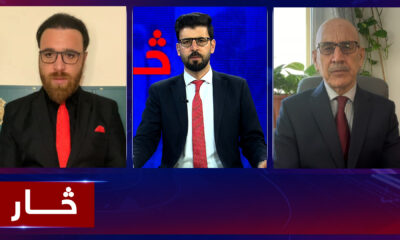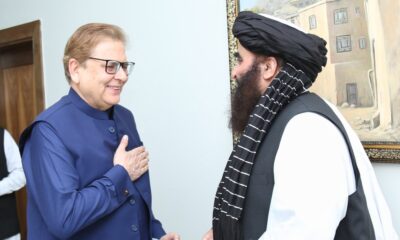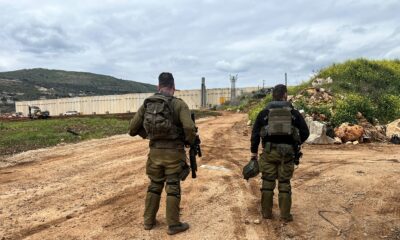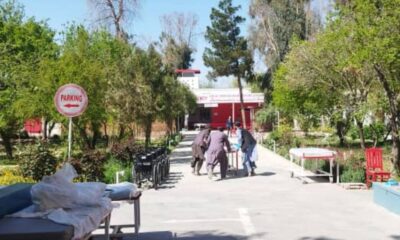Regional
Karabakh Armenians dissolve breakaway govt in capitulation to Azerbaijan
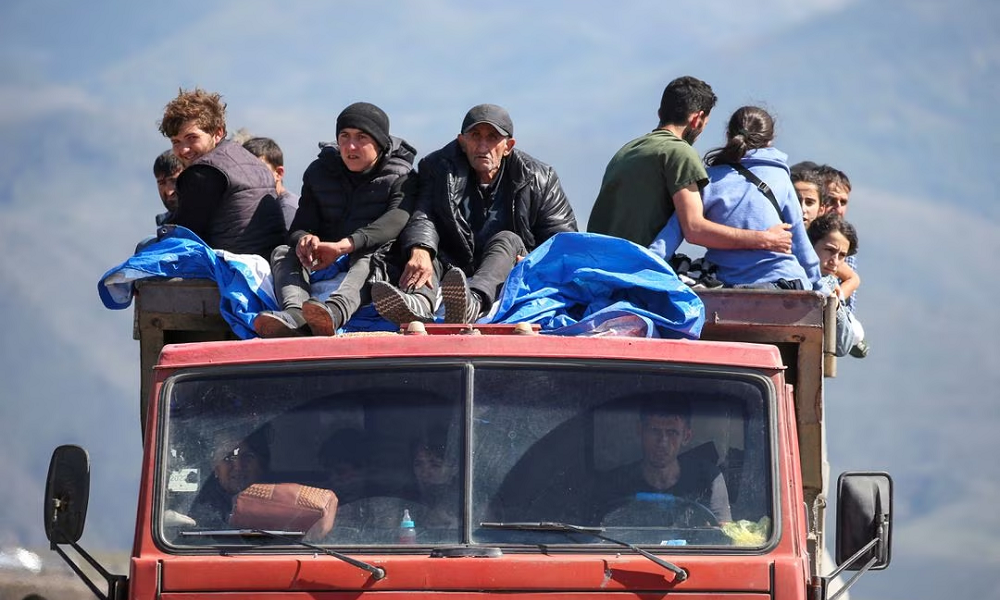
Ethnic Armenians in Nagorno-Karabakh said on Thursday they were dissolving the breakaway statelet they had defended for three decades, where more than half the population has fled since Azerbaijan launched a lightning offensive last week.
In a statement, they said their self-declared Republic of Artsakh would “cease to exist” by Jan. 1, in what amounted to a formal capitulation to Azerbaijan.
For Azerbaijan and its president, Ilham Aliyev, the outcome is a triumphant restoration of sovereignty over an area that is internationally recognised as part of its territory but whose ethnic Armenian majority won de facto independence in a war in the 1990s, Reuters reported.
For Armenians, it is a defeat and a national tragedy.
Some 70,500 people had crossed into Armenia by early Thursday afternoon, Russia’s RIA news agency reported, out of an estimated population of 120,000.
“Analysis of the situation shows that in the coming days there will be no Armenians left in Nagorno-Karabakh,” Interfax news agency quoted Armenian Prime Minister Nikol Pashinyan as saying. “This is an act of ethnic cleansing.”
Azerbaijan denies that accusation, saying it is not forcing people to leave and that it will peacefully reintegrate the Karabakh region and guarantee the civic rights of the ethnic Armenians.
Karabakh Armenians say they do not trust that promise, mindful of a long history of bloodshed between the two sides including two wars since the break-up of the Soviet Union. For days they have fled en masse down the snaking mountain road through Azerbaijan that connects Karabakh to Armenia.
Azerbaijan’s ambassador to London, Elin Suleymanov, told Reuters in an interview that Baku did not want a mass exodus from Karabakh and was not encouraging people to leave.
He said Azerbaijan had not yet had a chance to prove what he said was its sincere commitment to provide secure and better living conditions for those ethnic Armenians who choose to stay.
The Kremlin said on Thursday it was closely monitoring the humanitarian situation in Karabakh and said Russian peacekeepers in the region were providing assistance to residents. It said Russian President Vladimir Putin had no plans to visit Armenia.
Western governments have also expressed alarm over the humanitarian crisis and demanded access for international observers to monitor Azerbaijan’s treatment of the local population.
Samantha Power, head of the U.S. Agency for International Development (USAID), said this week she had heard “very troubling reports of violence against civilians”.
Azerbaijan said Aliyev had told her at a meeting on Wednesday that the rights of ethnic Armenians would be protected by law, like those of other minorities.
“The Azerbaijani president noted that the civilian population had not been harmed during the anti-terrorist measures, and only illegal Armenian armed formations and military facilities had been targeted,” a statement said.
Aliyev’s office said on Thursday he was visiting Jabrayil, a city on the southern edge of Karabakh that was destroyed by Armenian forces in the 1990s, which Azerbaijan recaptured in 2020 and is now rebuilding.
While saying he had no quarrel with ordinary Karabakh Armenians, Aliyev last week described their leaders as a “criminal junta” that would be brought to justice.
A former head of Karabakh’s government, Ruben Vardanyan, was arrested on Wednesday as he tried to cross into Armenia. Azerbaijan’s state security service said on Thursday he was being charged with financing terrorism and with illegally crossing the Azerbaijani border last year.
David Babayan, an adviser to the Karabakh leadership, said in a statement he was voluntarily giving himself up to the Azerbaijani authorities.
Mass displacements have been a feature of the Karabakh conflict since it broke out in the late 1980s as the Soviet Union headed towards collapse.
Between 1988 and 1994 about 500,000 Azerbaijanis from Karabakh and the areas around it were expelled from their homes, while the conflict prompted 350,000 Armenians to leave Azerbaijan and 186,000 Azerbaijanis to leave Armenia, according to “Black Garden: Armenia and Azerbaijan Through Peace and War”, a 2003 book by Caucasus scholar and analyst Thomas de Waal.
Many of the Armenians escaping this week in heavily laden cars, trucks, buses and even tractors said they were hungry and fearful.
“This is one of the darkest pages of Armenian history,” said Father David, a 33-year-old Armenian priest who came to the border to provide spiritual support for those arriving. “The whole of Armenian history is full of hardships.”
Regional
Hamas studies US ‘bridge’ proposal for truce as Israel escalates return to war
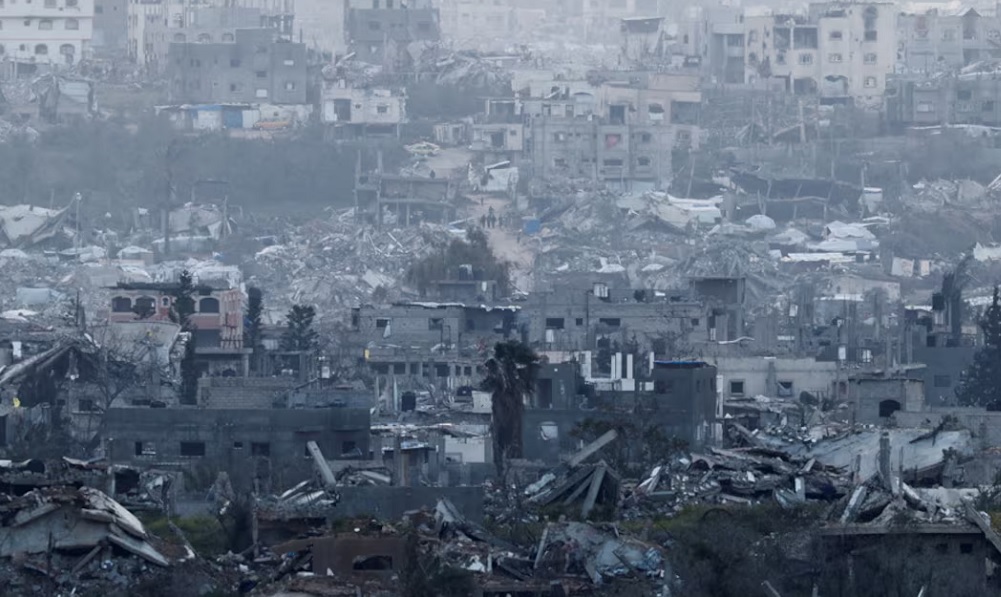
Hamas said on Friday it was reviewing a U.S. proposal to restore the Gaza ceasefire as Israel intensified a military onslaught to press the Palestinian militant group to free remaining Israeli hostages.
U.S. special envoy Steve Witkoff’s “bridge” plan, presented last week, aims to extend the ceasefire into April, beyond the holidays of Ramadan and Passover, to allow time for negotiations on a permanent cessation of hostilities, Reuters reported.
Three days after Israel effectively abandoned the two-month-old truce, Israeli Defence Minister Israel Katz said the military was intensifying its air, land and sea strikes and would move civilians to the southern part of Gaza.
Katz said Israel would continue its campaign until Hamas released more hostages and was totally defeated. Israeli airstrikes inflicted serious damage on Hamas this week, killing its Gaza government chief and other top officials.
But Palestinian and Israeli sources say Hamas has shown it can absorb major losses and still fight and govern.
Hamas said it was still debating Witkoff’s proposal and other ideas, with the goal of reaching a deal on prisoner releases, ending the war and securing a complete Israeli military withdrawal from the Gaza Strip.
A Palestinian official, speaking on condition of anonymity, told Reuters that Egypt also put forward a bridging proposal, but Hamas had yet to respond. The official declined to provide details of the plan, which he said was under consideration.
Two Egyptian security sources said Egypt had suggested setting a timeline for the release of the remaining hostages alongside a deadline for a full Israeli pullout from Gaza with U.S. guarantees.
The sources said the U.S. had signalled initial approval while Hamas’ and Israel’s responses were expected later on Friday.
A first phase of the truce ended at the start of this month, but Israel and Hamas could not agree on terms for launching the second phase. Hamas delayed further hostage releases and Israeli military action then resumed.
After two months of relative calm, Gazans were again fleeing for their lives under Israel’s new, all-out air and ground campaign, accompanied by another halt to aid deliveries.
Katz said the longer Hamas refused to free remaining hostages, the more territory it would lose. Of the more than 250 people originally seized in Hamas’ October 2023 attack on Israel, 59 remain in Gaza, 24 of whom are thought to be alive.
US BLAMES HAMAS FOR RESUMPTION OF ISRAELI ONSLAUGHT
Israeli airstrikes on Tuesday killed more than 400 Palestinians, one of the deadliest days of the 17-month-old war, and there has been scant let-up since.
On Friday, 13 people died. This included 11 people, among them six children, killed in Israeli airstrikes on houses in the Tuffah district of Gaza City in the enclave’s north, local health authorities said.
Two people were killed by tank fire in Abassan near Khan Younis in the south, according to Palestinian medics.
Hours later, the Israeli military said it had intercepted two projectiles from northern Gaza after alerts were activated in the Israeli city of Ashkelon.
Hamas’ armed wing claimed the attack, saying it was responding to Israeli “massacres against civilians” in Gaza.
Israel’s military reported it also intercepted a missile fired from Yemen after warning sirens sounded in multiple areas of Israel.
The Israeli military said it had killed the head of Hamas military intelligence in southern Gaza on Thursday. There was no immediate comment from Hamas.
The United States told the U.N. Security Council that Hamas was to blame for the deaths since hostilities resumed.
“Hamas bears full responsibility for the ongoing war in Gaza and for the resumption of hostilities. Every death would have been avoided had Hamas accepted the bridge proposal that the United States offered last Wednesday,” acting U.S. ambassador Dorothy Shea told the council.
The United Nations’ Palestinian relief agency UNRWA, one of the largest providers of food aid in Gaza, said it only had enough flour to distribute for the next six days.
“We can stretch that by giving people less, but we are talking days, not weeks,” UNRWA official Sam Rose told reporters in Geneva by video link from Gaza.
The humanitarian situation in Gaza was once again alarming, UNRWA said.
“Six of 25 bakeries that the World Food Programme were supporting had to close down,” Rose added.
“This is the longest period since the start of conflict in October 2023 that no supplies whatsoever have entered Gaza. The progress we made as an aid system over the last six weeks of the ceasefire is being reversed.”
Israel’s blockade has pushed up prices of fuel and essential foods, forcing many to ration their meals.
The war began after Hamas militants attacked Israeli communities near the Gaza border on October 7, 2023, killing 1,200 people, according to Israeli tallies.
More than 49,000 Palestinians have been killed in the ensuing conflict, according to Gaza’s health authorities, with much of the densely populated territory reduced to rubble.
Regional
Iran’s leader says Yemen’s Houthis act independently, warns against US action
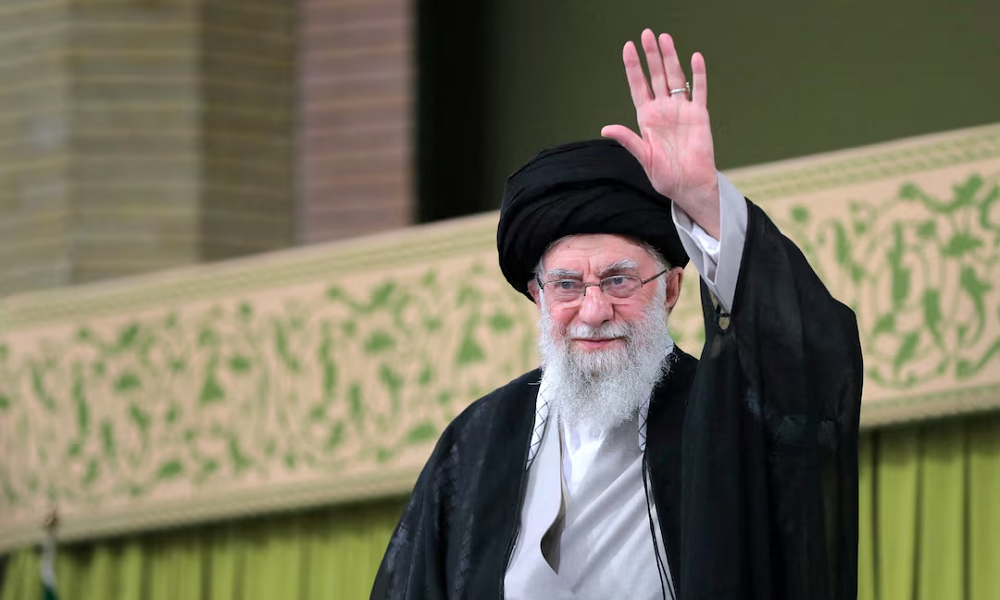
Iran’s Supreme Leader Ayatollah Ali Khamenei said on Friday that Tehran does not need proxies in the region and that Yemen’s Houthis, who are among the groups in the Middle East that Iran is aligned with, act on their own motivations.
U.S. President Donald Trump said on Monday he would hold Iran responsible for any attacks carried out by the Houthis, as his administration expanded the biggest U.S. military operation in the Middle East since he returned to the White House.
Over the years, Iran has been aligned with groups across the region that describe themselves as the “Axis of Resistance” to Israel and U.S. influence.
Those groups include Hamas, Lebanon’s Hezbollah and various Shi’ite armed groups in Iraq.
Americans, said Khamenei, “make a big mistake and call regional resistance centres Iranian proxies. What does proxy mean?”
“The Yemeni nation has its own motivation and the resistance groups in the region have their own motivations. Iran doesn’t need proxies,” Khamenei said.
“They issue threats,” added Khamenei, but “we have never started a confrontation or conflict with anyone. However, if anyone acts with malice and initiates it, they will receive severe slaps.”
Experts on Yemen, where the Houthis expanded control during years of civil war, say the group seems mainly motivated by its domestic concerns and support base.
(Reuters)
Regional
At least 91 killed in Gaza as Israel abandons ceasefire, orders evacuations
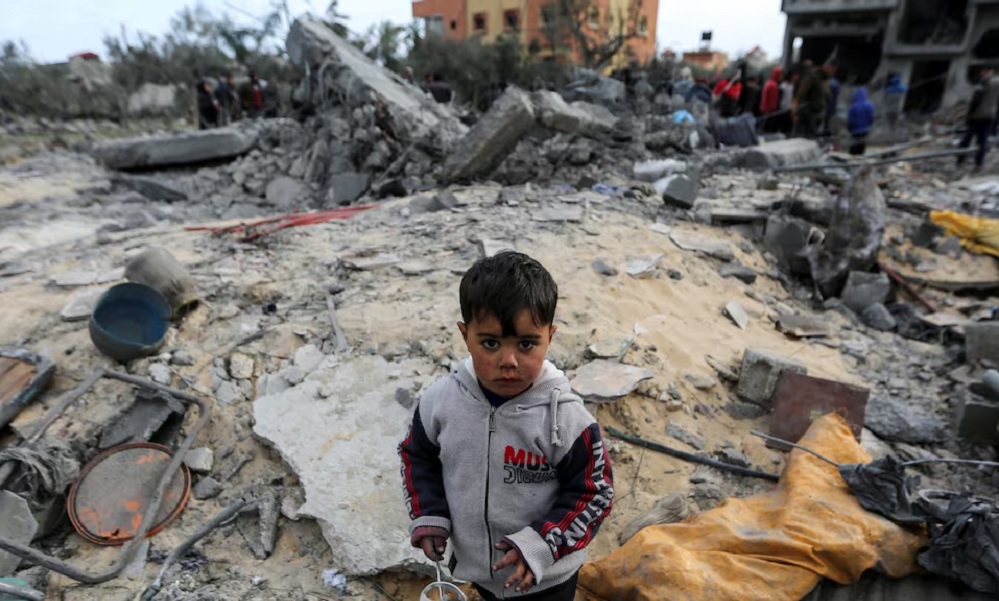
At least 91 Palestinians were killed and dozens wounded in airstrikes across Gaza on Thursday after Israel resumed bombing and ground operations, the enclave’s health ministry said, effectively ditching a two-month-old ceasefire.
After two months of relative calm, Gazans were again fleeing for their lives after Israel effectively abandoned a ceasefire, launching a new all-out air and ground campaign against Gaza’s dominant Palestinian militant group Hamas, Reuters reported.
Israeli aircraft dropped leaflets on residential neighbourhoods, ordering people out of Beit Lahiya and Beit Hanoun towns in the north, the Shejaia district in Gaza City and towns on the eastern outskirts of Khan Younis in the south.
Late on Thursday, Israel’s military said it had begun ground operations in the Shaboura district of Gaza’s southernmost city Rafah, which abuts the Egyptian border.
“War is back, displacement and death are back, will we survive this round?” said Samed Sami, 29, who fled Shejaia to put up a tent for his family in a camp on open ground.
A day after sending tanks into central Gaza, the Israeli military said on Thursday it had also begun conducting ground operations in the north of the densely populated enclave, along the coastal route in Beit Lahiya.
Hamas, which had not retaliated during the first 48 hours of the renewed Israeli assault, said its fighters fired rockets into Israel. The Israeli military said sirens sounded in the centre of the country after projectiles were launched from Gaza.
Some Gazans said there were no signs yet of preparations by Hamas on the ground to resume fighting. But an official from one militant group allied to Hamas, who asked not to be identified, told Reuters on Thursday that fighters, including from Hamas, had been put on alert awaiting further instructions. Fighters had also been told to stop using mobile phones.
With talks having failed to bridge differences over terms to extend the ceasefire, the military resumed its air assaults on Gaza with a massive bombing campaign on Tuesday before sending soldiers in the day after.
HUNDREDS DEAD
It said on Thursday that its forces had been engaged for the past 24 hours in what it described as an operation to expand a buffer zone separating the northern and southern halves of Gaza, known as the Netzarim corridor.
Israel ordered residents to stay away from the Salahuddin road, Gaza’s main north-south route, and said they should travel along the coast instead.
Tuesday’s first day of resumed airstrikes killed more than 400 Palestinians, one of the deadliest days of the 17-month-old conflict, with scant let-up since then.
In a blow to Hamas as it sought to rebuild its administration in Gaza, this week’s strikes have killed some of its top figures, including the de facto Hamas-appointed head of the Gaza government, the chief of security services, his aide, and the deputy head of the Hamas-run justice ministry.
Hamas said the Israeli ground operation and the incursion into the Netzarim corridor were a “new and dangerous violation” of the ceasefire agreement. In a statement, it reaffirmed its commitment to the deal and called on mediators to “assume their responsibilities”.
For Israel, a return to full-blown war could prove complicated, some current and former Israeli officials say, amid waning public support and burnout among military reservists. Protesters accuse Netanyahu of continuing the war for political reasons and endangering the lives of remaining hostages.
A temporary first phase of the ceasefire ended at the start of this month. Hamas wants to move to an agreed second phase, under which Israel would be required to negotiate an end to the war and withdrawal of its troops from Gaza, and Israeli hostages still held there would be exchanged for Palestinian prisoners.
Israel has offered only a temporary extension of the truce, cut off all supplies to Gaza and said it was restarting its military campaign to force Hamas to free remaining hostages.
The Israeli military said it had intercepted two missiles fired towards Israel from Yemen on Thursday, one in the early hours and the other in the evening. There were no reports of casualties. Iran-aligned Yemeni Houthi forces have occasionally fired missiles at Israel in support of Palestinians in Gaza.
‘WE DON’T WANT DEATH’
The ceasefire had allowed Huda Junaid, her husband and family to return to the site of their destroyed home to camp out in the ruins. But they were now forced to flee again, packing their few remaining belongings into a donkey cart and searching for a new place to pitch their tent near a school.
“We don’t want war, we don’t want death. Enough, we are fed up. There are no longer children in Gaza, all of our children are dead, all of our relatives are dead,” she said.
Speaking to Reuters on Thursday, a Hamas official said mediators had stepped up efforts with the two warring sides but no breakthrough had yet come.
The war began after Hamas militants attacked Israeli communities near the Gaza border in October 2023, killing 1,200 people and taking over 250 hostages, according to Israeli tallies.
More than 49,000 Palestinians have been killed in the ensuing conflict, according to Gaza’s health authorities, with much of the enclave reduced to rubble.
-

 Sport4 days ago
Sport4 days agoIPL 2025 celebrates 18 years of immense success
-

 World3 days ago
World3 days agoPutin agrees to 30-day halt on energy facility strikes in Ukraine
-
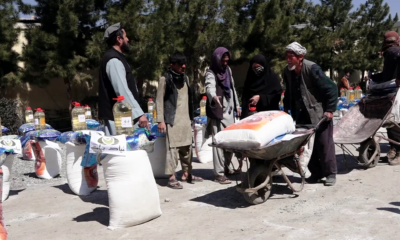
 Latest News4 days ago
Latest News4 days agoBayat Foundation helps needy families in Kabul during Ramadan
-

 Latest News3 days ago
Latest News3 days agoTorkham crossing to reopen after 25-day shutdown
-
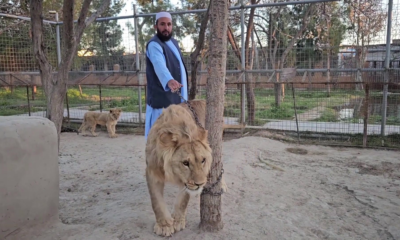
 Latest News3 days ago
Latest News3 days agoHelmand environmental department opens new Zoo
-

 Latest News4 days ago
Latest News4 days agoAfghan-Pakistan talks to reopen Torkham border ‘end on positive note’
-
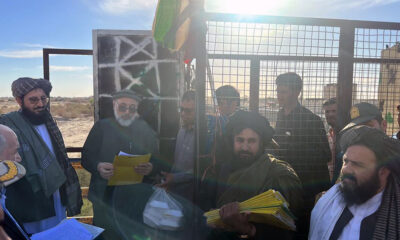
 Latest News2 days ago
Latest News2 days agoAfghan prisoners in Iran sent home
-

 Tahawol5 days ago
Tahawol5 days agoTahawol: Discussion on India, Pakistan trading accusations


